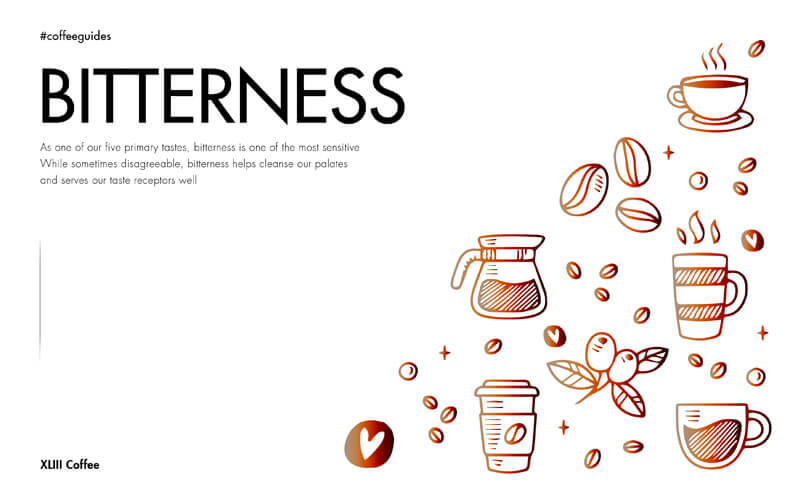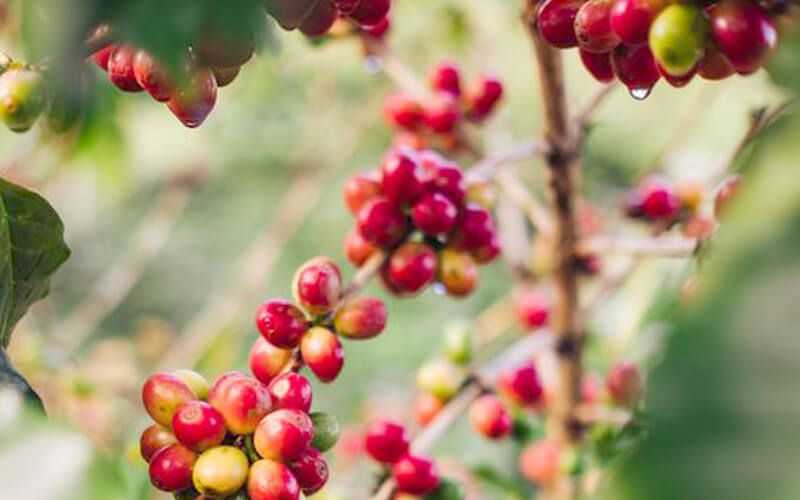Bitterness of coffee is not as bad as you think
– TASTE THE ORIGIN –
Bitterness is often associated with cups of dark roasted coffee. It is considered an indispensable attribute in a delicious cup of coffee. However, many people believe that coffee should not have a bitter taste, but instead have fruit flavors. So what really is the bitter taste of coffee? How is it created? Let’s explore with 43 Factory Coffee!
Bitterness – inherent sensory characteristics of coffee
Bitterness or bitter taste is a special sensory characteristic of coffee. It is the characteristic, dominant flavor in roasted coffee beans. Coffee has a naturally bitter taste due to caffeine, but only about 10-15% of the bitterness is due to caffeine. The main cause is due to some acids and proteins. Sensory cells on the tongue contain many proteins. When tasted, there will be about 35 proteins on the tongue that react with compounds in coffee, creating a bitter feeling. These compounds are called phenolic compounds. Among them, the most popular is chlorogenic acid. It accounts for 8% of the volume of green coffee beans. There are two types of chlorogenic acid that are the main causes of coffee’s bitter taste: 5-caffeoylquinic acid (the most common acid in green coffee) and di-CGA.
Coffee has a small amount of bitterness that can suppress sourness, creating a flavorful balance. However, when bitter ingredients are over-extracted, they overwhelm the sugar and other flavors. This makes your coffee too bitter and unpleasant.

How is the bitterness of coffee created?
There are many reasons why coffee tastes bitter. Some main reasons are:
From the characteristics of the cultivar
Coffee inherently contains bitter chemical compounds such as caffeine and chlorogenic acid. This is a smooth, bold, natural bitter taste that can bring balance to coffee. Depending on the genetic characteristics of caffeine content and metabolism, each type of coffee will have a different level of bitterness. Some types of coffee have a strong bitter taste that reminds you of pure chocolate. Some have a bitter taste like grapefruit or a fermented bitter taste similar to wine. For example, El Salvador will have a mild and pleasant orange bitterness. Sumatran coffee will have a very woody and spicy flavor with a bitter taste like anise or licorice.

From the roasting process
The temperature and pressure of the coffee roasting process drives the chemical reactions that create flavor. Some substances will decompose into chlorogenic acid lactone and phenylindanes causing a bitter taste. Acid lactone will have a slightly bitter taste. Light to medium roast levels will have more lactone acid so the coffee flavor will be pleasant. Darker roasts will have more phenylindanes creating a “persistent, sharp bitterness.” In addition, when roasted at too high a temperature or for a long time, the beans can caramelize and carbonize too much, causing a bitter, unpleasant taste. Therefore, most specialty coffee roasters avoid dark roasts to avoid chemical reactions that increase bitterness, overwhelming the characteristic flavors.

From the preparation process
Coffee is easily affected by external factors. Roasted coffee will stay at its freshest for two to three weeks after roasting. After this period of time, the flavor quickly decomposes, resulting in a cloudy, bitter taste. Furthermore, if the powder is ground too finely, the coffee flavor will be denser. Compounds in the seeds, along with chlorogenic acid lactone and phenylindanes, will be pulled out. In addition, if you use water that is too hot, the brewing time is too long, and the coffee will extract too much acid and caffeine, causing bitterness.

Therefore, if you do not like excessive bitterness, the best way is to brew coffee at the highest freshness, choosing the appropriate grind level, amount of water, temperature and time.
You can choose fresh, delicious, roasted specialty coffee beans at XLIII Coffee – A brand developed from the predecessor 43 Factory Coffee Roaster.
Don’t forget to follow our news channel for more useful information!
Related articles:
– The cup of coffee you are using every day contains acid!
– 7 common defects of green coffee and how manufacturers prevent them
– How does the roasting process affect the body of a cup of coffee?






